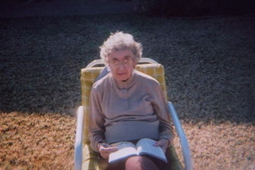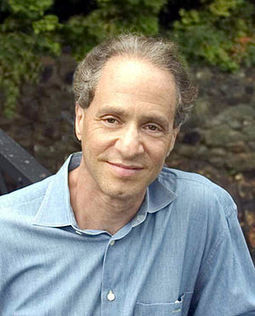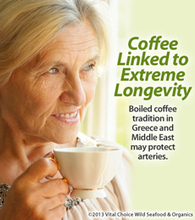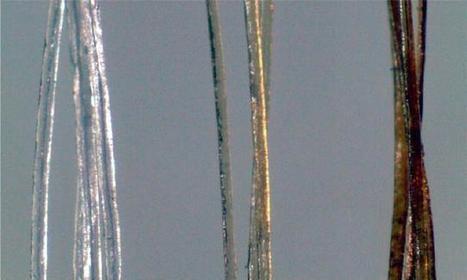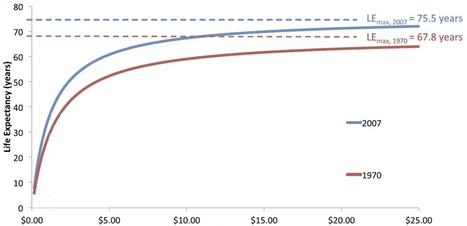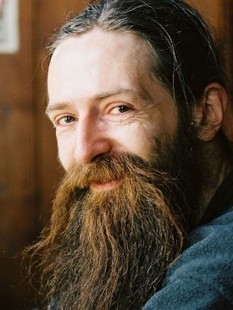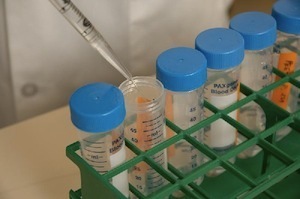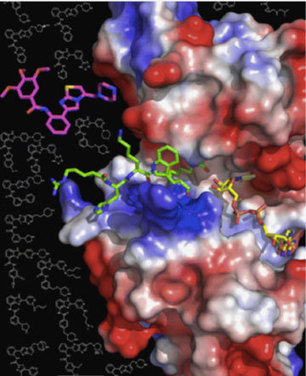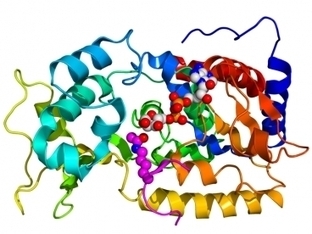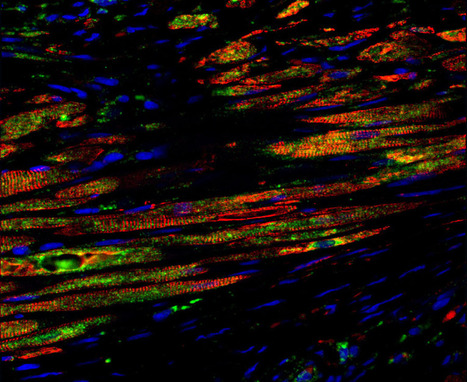 Your new post is loading...
 Your new post is loading...
The Mediterranean diet appears to be associated with longer telomere length — a marker of slower aging and thus long life, a study published in the BMJ this week suggests.
The Mediterranean diet has been consistently linked with health benefits, including reduced mortality and reduced risk of chronic diseases, such as heart disease.
The diet is based on a high intake of vegetables, fruits, nuts, legumes (such as peas, beans and lentils), and (mainly unrefined) grains; a high intake of olive oil but a low intake of saturated fats; a moderately high intake of fish, a low intake of dairy products, meat and poultry; and regular but moderate intake of alcohol (specifically wine with meals).
Humans are living longer, but for many, longevity doesn’t equal quality of life. Increasingly, the final years are marked by a steady cognitive decline where memory and personality are swallowed in dementia. Alzheimer’s disease (AD) is on the rise, and there is no treatment. Worse, researchers and drug companies wrestling with the disease seem to have hit a wall. Most recently, Baxter announced its Alzheimer’s treatment, Gammagard, proved ineffective at its twin goals of reducing cognitive decline and preserving cognitive abilities in a 490-patient Phase III trial. Although the trial showed some positive results in participants genetically predisposed to the disease, Baxter will discontinue current immunoglobulin studies in Alzheimer’s.
Ray Kurzweil plans to live forever. All power to him. Mr. Kurzweil’s contributions to mankind arguably have been so extraordinary that perhaps we owe it to him to provide him medical care in perpetuity. ... Ultimately, the question is this: are Americans entitled to unlimited life expectancy?
Countering some minor concerns (see our sidebar, “Coffee concerns: minor at most”), growing evidence indicate that coffee is probably a preventive-health powerhouse.
There’s little doubt that coffee’s promise stems from its abundance of highly healthful polyphenol-type compounds.
Although polyphenols are often called antioxidants, they don’t exert direct antioxidant effects in the body. Instead, they influence gene expression to produce antioxidant, anti-inflammatory, and other beneficial effects.
Attention seniors: French scientists have developed a process that permanently dyes white hair without harmful chemicals. Philippe Walter and colleagues soaked white hairs in a solution containing fluorescent gold nanoparticles. The hairs turned pale yellow and then darkened to a deep brown. The color remained even after repeated washings.
GDP $ per capita vs. life expectancy for 180 countries. In 2007 everyone lives longer than in 1970 because the health system is better, but in both cases, Global lifespans have risen dramatically in the past 40 years, but the increased life expectancy is not benefitting body equally, say University of Toronto researchers. In particular, adult males from low- and middle-income countries are losing ground.
Aubrey de Grey, Chief Science Officer of SENS Foundation and the world’s most prominent advocate of anti-aging research, argues that it makes no sense to spend the vast majority of our medical resources on trying to combat the diseases of aging without tackling aging itself, writes ethicist Peter Singer on Project Syndicate.
De Grey believes that even modest progress in this area over the coming decade could lead to a dramatic extension of the human lifespan.
An efficient, high-volume technique for testing potential drug treatments for Alzheimer's disease uncovered an organic compound that restored motor function and longevity to fruit flies with the disease, according to new research that could help...
Via LeapMind
Toni Balcean turned 101 in September. How’d she beat a century? Simple. “Clean living and good Italian wine.” Case closed! Unless, of course, you like science. A retooled Archon Genomics X PRIZE aims to help scientists better understand healthy aging by sequencing 100 healthy centenarian genomes—in a month, with an accuracy of one error per million base pairs, and for under $1,000 per genome. All this may sound eerily familiar. In fact, the Archon Genomics X PRIZE was first proposed back in 2006. Singularity Hub covered it in 2008 when the goal was to sequence 100 human genomes in 10 days for less than $10,000 per genome. Grant Campany, Senior Director of the Archon Genomics X PRIZE, recently told Singularity Hub, “From 2006 to 2009, competitors registered for the Archon Genomics X PRIZE with the best of intentions, but over the past few years the industry has fragmented significantly, so we needed to restructure the competition to be more inclusive of the emerging and established sequencing platforms.” So, in October 2011, the X PRIZE announced a new set of criteria. The payout remains $10 million; however, the Foundation upped the sequencing period to 30 days and made the target cost $1,000 to reflect rapidly declining sequencing prices.
Anthocyanins are pigments found in red/purplish fruits and vegetables, including purple cabbage, beets, blueberries, cherries, raspberries and purple grapes, as well as some cereal grains. A study published in 2012 indicates that anthocyanins help reduce inflammation caused by hypercholesterolemia. Eating a variety of colorful foods, emphasizing fruits and vegetables, is continuously upheld as a strategy to help mitigate disease and maintain a healthy long life. REF: Nutrition, Metabolism & Cardiovascular Diseases, published online August 20, 2012 Authors:Y. Zhu; W. Ling; H. Guo; F. Song; Q. Ye; T. Zou; D. Li; Y. Zhang; G. Li; Y. Xiao; F. Liu; Z. Li; Z. Shi; Y.
A few weeks ago, PBS NewsHour ran a 10-minute piece with Kurzweil titled “As Humans and Computers Merge…Immortality?” from correspondent Paul Solman for his economics-focused Making Sen$e of Financial News. Solman probes Kurzweil for some insights about where technology is headed in the coming decades, covering topics like artificial intelligence, extending lifespans through supplementation, and digital resurrection of the deceased as avatars.
There is a glut of health-related smartphone apps. But how many are of any real use? And what are some of the benefits of using one of these apps? Beyond calorie tracking, there are actually quite a few apps out there that can help push you towards your optimal health. You can check symptoms, maintain healthy weight, monitor blood pressure, track supplements, and even make sure you brush your teeth properly. Check out these top 10 suggestions (most are free) health apps from one source.
Will we one day be able to live forever? According to inventor/author Ray Kurzweil, eternal life is now actually on the horizon -- the near horizon. He predicts that by 2029, biomedical technology will be extending longevity faster than we age.
|
In a recent study, researchers at the University of California Los Angeles (UCLA), say that activating a gene, AMPK, in fruit flies’ intestines was found to add 30% to their average lifespans—up to eight weeks from the typical six weeks.
Beyond simply boosting lifespans, the flies stayed healthier too.
Scientists discover how to slow down aging in mice and increase longevity
Blocking a specific protein complex in the hypothalamus and injecting a hormone slow aging and cognitive decline
Their discovery of a specific age-related signaling pathway opens up new strategies for combating diseases of old age and extending lifespan.
Researchers from UCLA and UC Berkeley have, for the first time ever, solved the puzzle of how the various components of an entire telomerase enzyme complex fit together and function in a three-dimensional structure. The telomerase enzyme, which is known to play a significant role in aging and most cancers, represents a breakthrough that could open up a host of new approaches to fighting disease. The creation of the first complete visual map of thetelomerase enzyme, which is known to play a significant role in aging and most cancers, represents a breakthrough that could open up a host of new approaches to fighting disease, the researchers said.
"Everyone in the field wants to know what telomerase looks like, and there it was. I was so excited, I could hardly breathe," said Juli Feigon, a UCLA professor of chemistry and biochemistry and a senior author of the study. "We were the first to see it."
Via Dr. Stefan Gruenwald
A new study demonstrates what researchers consider conclusive evidence that the red wine compound resveratrol directly activates a protein that promotes health and longevity in animal models. What’s more, the researchers have uncovered the molecular mechanism for this interaction, and show that a class of more potent drugs currently in clinical trials act in a similar fashion. Pharmaceutical compounds similar to resveratrol may potentially treat and prevent diseases related to aging in people, the authors contend.
Session 1: Longevity of the oldest-old (Chair: Bill Butz) Leonid A. Gavrilov and Natalia S. Gavrilova: “Determinants of exceptional human longevity: new ideas and findings” moreJon Anson: “Surviving to be the oldest old – destiny or chance?” moreKaren Cheung SL and Jean-Marie Robine: “Predictors of longevity: evidence from the near-centenarians and centenarians in Hong Kong” moreSession 2: Time trends in longevity and mortality (Chair: Graziella Caselli)Frans van Poppel, Govert Bijwaard, Mart van Lieburg, Fred van Lieburg and Rik Hoekstra: “Medical men: forerunners in the mortality decline in the Netherlands?” moreJim Oeppen and Oskar Burger: “North-west European exceptional longevity in a global context: 1550-2000” moreMaria Winkler-Dworak: “The low mortality of Learned Societies: an international comparison” more
LONDON (Reuters) - The world has made huge progress fighting killer infectious diseases, but as a result we now lead longer and sicker lives, with health problems that cause us years of pain, disability...
The tiny freshwater polyp Hydra is a remarkable creature. It does not show any signs of ageing and appears to be immortal. Researchers from Kiel University have examined this phenomenon and uncovered an important link to the ageing process in humans that could lead to the development of advanced rejuvenation therapies. How does the polyp Hydra do this? It accomplishes the feat of apparent immorality by reproducing through budding rather than mating. Each polyp contains stem cells capable of continuous proliferation. Without this endless supply of regenerating stem cells, the animals could not reproduce.
Interesting quotes from this story: “There’s a shocking amount of genetic similarity between jellyfish and human beings,” “Immortality might be much more common than we think,”
Following a healthy lifestyle can lead to a significantly longer life, even among people who are already well into their 70s, new research shows. This study followed people in their mid-70s and older for almost twenty years. Researchers found a strong association between lifestyle and life expectancy. "Physical activity was the single biggest predictor of longevity."
SIRT1, a protein that slows aging in mice and other animals, also protects against the ravages of a high-fat diet, including diabetes, according to a new MIT study.
KurzweilAI: Damaged and aged heart tissue of older heart failure patients was rejuvenated by stem cells modified by scientists, according to research presented at the American Heart Association’s Basic Cardiovascular Sciences 2012 Scientific Sessions. The research could one day lead to new treatments for heart failure patients, researchers said.
Medical records that patients can access online may encourage more people to get recommended screening tests and immunizations, a new study suggests. In a clinical trial at eight primary care practices, researchers found that patients who used such "interactive" health records were more likely to become up-to-date on recommended preventive care. That included screening tests for breast, colon and cervical cancers, and immunizations like the yearly flu shot
|
 Your new post is loading...
Your new post is loading...
 Your new post is loading...
Your new post is loading...








